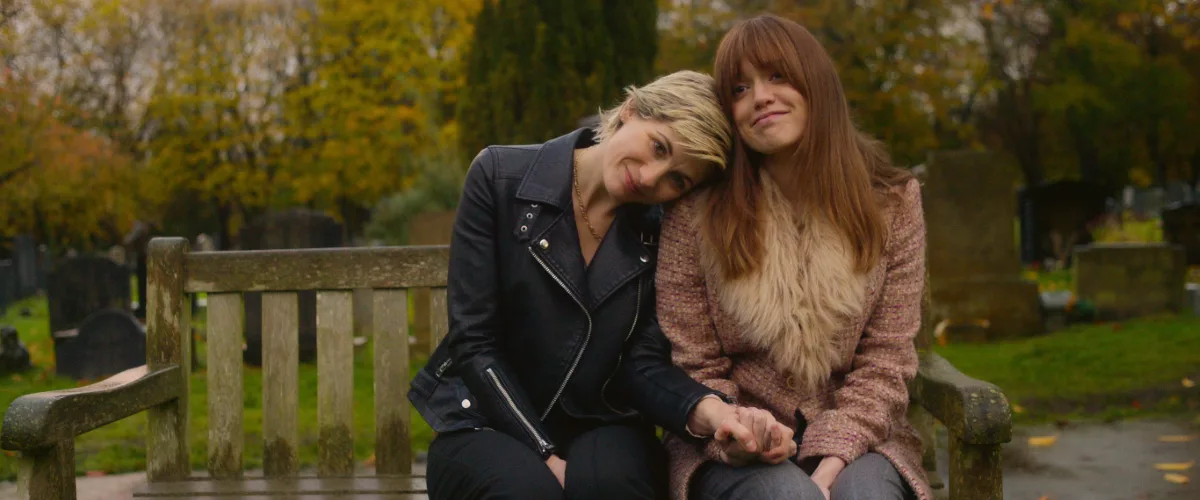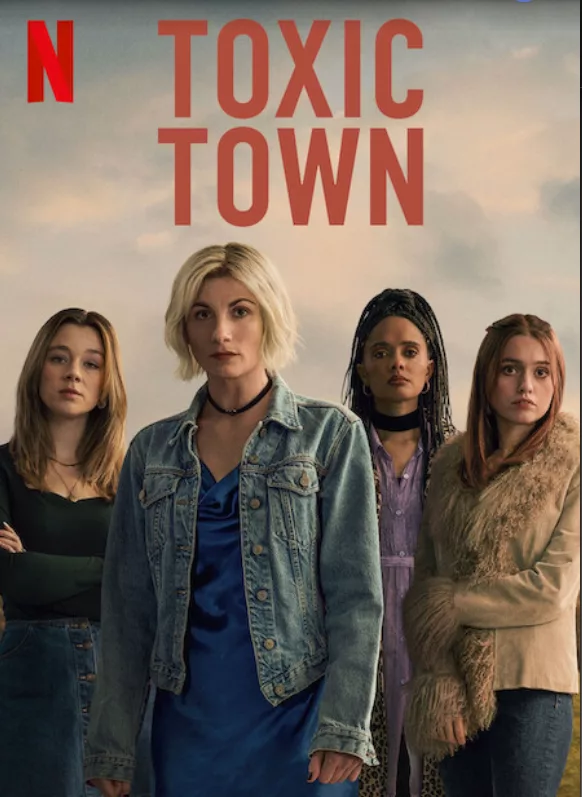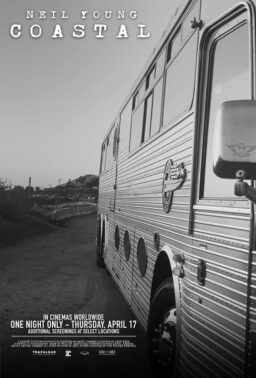In 1984, the town of Corby, located 72 miles northwest of London, began the process to bulldoze the steelworks that had previously served as the area’s predominant source of employment. To achieve this plan, they ferried poisonous sludge, burnt orange and mud brown in color, through Corby at high speeds, and dumped the stuff into a landfill. The resulting environmental devastation—dust particles in the air, runoff seeping into the water supply—led to birth deformities for dozens of infants born in the area.
In four hour-long episodes, “Toxic Town” explores the council’s negligence and greed, as well as the hard-charging efforts of the affected mothers for justice and their eventually successful lawsuit. The excellent cast is led by Jodie Whittaker, who plays real-life Corby mother Susan McIntyre. Already a mother to a son, Susan discovers she is pregnant, which cheers her and her husband Peter (Michael Socha). Their joy fizzles when their son, Connor, is born without fingers on his left hand.
On the maternity ward at the same time as Susan, Tracey Taylor (Aimee Lou Wood), also based on a real-life resident, gives birth to Shelby Ann, who has a deformed ear, no kidneys, and a heart that has only two chambers instead of four. One of the series’ most devastating scenes is Shelby’s death, depicted only in the form of Tracey wiping rust-colored dust off her newborn daughter’s gravestone. Maggie Mahon’s (Claudia Jessie) husband Derek (Joe Dempsie, always great) is a member of the devil-may-care lorry-driving team that transports the sludge dozens of times a day across town to a hole in the ground; the faster he drives, the more loads he delivers, and the more he gets paid. Their son Samuel is born with a clubfoot.
If Brendan Coyle was keen to shed the overwhelming cheesiness of his association with “Downton Abbey,” he succeeds here as Roy Thomas, the rapacious head of the town council and a character based on several people, including infamously unfeeling Corby council leader Kelvin Glendenning. Thomas hypes the neoliberal promise of economic revitalization with the enthusiasm of a circus promoter, all while he placidly bats away senior engineer Ted Jenkins’ (Stephen McMillan, excellent) concerns about the high levels of toxins in the air and ground. Every time Ted files a report, someone makes sure it’s suppressed. He’s repeatedly offered bribes he rejects. Frustrated and furious, he turns to Sam Hagen (Robert Carlyle), the only morally upright town councillor who, in real life, became the whistleblower on Corby’s corrupt business and environmental practices.
But their efforts are largely in vain, resulting in vandalized cars and evidence destroyed in mysterious fires. It’s not until journalist Graham Hind begins writing in the Sunday Times about the affected mothers that everyone has to sit up and pay attention. Lawyer Des Collins (Rory Kinnear) wins a bid to represent the mothers in court. And though the families’ tragedies began in the mid-1980s, a judge did not hear the case in court till 2009.
Some of director Minkie Spiro’s imagery is, indeed, ham-fisted. Maggie scrubs the dust off their home windows and beats the dust out of Derek’s uniforms in their garden; multiple close-ups show rivers of toxins entering the municipal sewers. The characterization of the bad guys veers on underwritten, if not cartoonish, especially builder Pat Miller (Ben Batt). Jack Thorne’s dialogues can seem overwrought; by the end of the series people are yelling in far too forthright a manner when a more subtle display of their beliefs might be better.
But as with plenty of British series, the acting more than makes up for lapses in other creative departments. Dempsie is subtly riveting as a father struggling with the fact that his earnest desire to improve his family’s finances may have harmed his own son. The quiet ballet of despair that plays out between Susan and Peter as they bring Connor home is an interesting avenue for such a drama to explore; in fact, the toll that the children’s disabilities take on each of their parents’ marriages provides immense pathos to the narrative. By far the best onscreen collaboration, however, belongs to Whittaker and Wood. Susan’s sarcastic, blunt ways go hand in hand with Tracey’s confident reserve, and both performers wrenched quite a few tears out of this writer.
When you get in the habit of watching and reviewing American television, you forget the joys of emotionally economical British television. There’s no histrionics, no lengthy monologues, no “Perry Mason”-style tricks in the courtroom. Funnily enough, British reviews of “Toxic Town” consider the series’ tone to be quite cheesy, but in comparison to American dramas, these four episodes feature the most restraint of any series I’ve seen in a while. Sure, the writing and directing could be better, but the dread frequently building up in the viewer is not dissimilar to that inspired by the “Aberfan” episode of “The Crown,” or any given moment of “Chernobyl.” All in all, “Toxic Town” makes for a harrowing watch, and the fact that the mothers won £14.6 million in compensation after almost ten years of anxiety, rage, and sorrow is reason enough to watch.
All episodes screened for review. Now on Netflix.
















